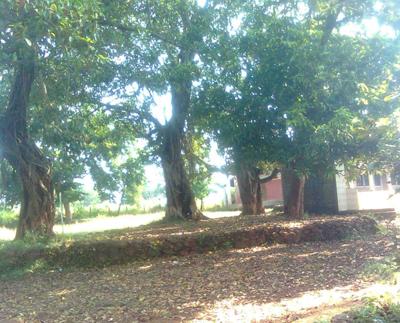
Custom Search
Daybreak
by Sneha Subramanian Kanta
(Mumbai, India)
The reflection of the streetlight at the end of this road cuts the half of my face. As I look into the mirror, my wrinkles are the only thing highlighted. At one corner in the city of Kolkata, in a forsaken and dark lane, a rickshawala smokes a beedi. Somewhere across the lanes of New Market, a shopkeeper is closing his shop. Amidst the Ganga ghat, a boatman is gently padding his way through the water and singing the song of the river.
There is so much of hustle and bustle, and silent ruffling that go on this city. One thing after another happens so quickly; everything seems so full of life.
I look at the painting I brought once in an art exhibition. It has nothing striking, for sure. In fact, you wouldn't understand what it is. That is how art is anyway right; it gains meaning from one interpretation to another; just like the village seems; in this particular painting. It seems like a random village and people going about doing their work. However, I can sense the uneasiness of the boy as he has an awkward expression going to school: maybe the master is too hard on him. And this woman carrying a pot of water in her head, I can sense her anxiety of going back home soon; perhaps she has a small child she's left in the cradle.
The shrilling temperature of the night proves to me that the hour is hardhearted and cold. I get past the bedroom and come to the hall. There are three books lying on the table and one newspaper on the sofa.
I see a spider spurn a web near the flower pot kept inside the house. I take no care to drive it away. Outside, I can hear the sound of some dogs, which are possibly having a street brawl. I'm in no sense to pacify anyone: least of all my senses.
I let the voices of the dogs, screeching and
I can see many images today. Why, the images that were so animated thirteen hours ago are still so alive: that of my daughter Bhakti and son-in-law Rajesh and me. I, looking at that mighty truck and Bhakti and Rajesh pushed to the edge of the road by its merciless wheels.
Thankfully, Rajesh is fine, but I'm now worried about my daughter. I can still visualize her walking past this lane and the streetlights reflecting on her, as though she is in the spotlight. I can still see her crying when her mother died; I can still vividly visualize the pain in her eyes. And I could see her lying down helplessly when she met with an accident.
I hear the sound of the milkman peddling his cycle away. I can almost imagine him in a visual spectrum; with a thick sweater and a turban, asking me, "Neeraj babu, how much milk do you want today?"
A moment later, I answer the phone call from Rajesh to hear:
"Papa, it is a girl. Mother and the baby both are safe."
I step out of the horrid clutches of the killing night and I see traces of light. They've become vibrant now; and are shining. The street lights are now shut, and the black sky is now being churned into white. It is time for me now; time to end the night chronicle and look for the day ahead. I quickly wear my chappals, and I'm getting ready to welcome the new, bustling life. I should reach the hospital quickly.
I leave the thought-corpses of yesterday, now the past where they should be- away.
Glossary:
Rickshawala: A person who rives auto rickshaws.
Beedi: A tobacco flake wrapped with a tendu leaf and coloured threads at both ends.
Babu: A man is usually addressed as 'babu' in some parts of India to give respect.
Chappals: Footwear.
Comments for Daybreak
|
||
|
||
|
||
|
||
|
||
|
||








